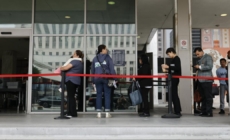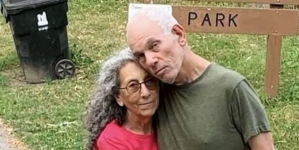-
Torrance boy, 9, detained by ICE for planned deportation to Honduras; community outraged - about 1 min ago
-
Florida man convicted in 2004 cold case death of victim whose remains have not been found - 12 mins ago
-
‘Cheers’ actor George Wendt’s death linked to heart conditions - 15 mins ago
-
Musk On If Trump Should Be Impeached: ‘Yes’ - 21 mins ago
-
FOX Super 6 contest: Chris ‘The Bear’ Fallica’s Belmont Stakes picks - 29 mins ago
-
Prison for Instagram? L.A. authorities target street racing influencer - 40 mins ago
-
Tesla stock price plunges as Trump suggests stripping Elon Musk’s companies of federal contracts - 49 mins ago
-
Man sentenced for fatally severing the spine of ex-girlfriend’s 2-year-old daughter - 57 mins ago
-
Former NFL QB Suggests Shocking Trade Idea for Dolphins’ Tyreek Hill - about 1 hour ago
-
Kylian Mbappé converts on penalty, helps France trim deficit vs. Spain - about 1 hour ago
Philadelphia Warned of Hypothermia, Frostbite as Record-Breaking Cold Hits
Philadelphia residents are bracing for an intense cold wave as temperatures plummet to record-breaking lows and the National Weather Service (NWS) warns of hypothermia and frostbite.
Why It Matters
Philadelphia’s extreme weather highlights the impact of a powerful winter storm that has swept across much of the country, affecting millions. With daytime highs in the upper teens and wind chills that make the temperature feel even colder, the frigid conditions have strained energy supplies and posed challenges for emergency services.
Forecasters warn that the arctic air mass could lead to significant health and safety risks, including hypothermia and frostbite, as well as disruptions to daily life.
What To Know
The NWS has issued a cold weather advisory, with wind chill values expected to drop to 10-below zero. This comes as Philadelphia experiences temperatures nearly 58 percent below the five-year average for this time of year, marking one of the coldest days on record for January 21.
The cold wave is part of a larger system that has pushed arctic air deep into the eastern United States. Philadelphia’s high temperature on Tuesday is projected to hover around 19, with lows dipping to single digits. Wind gusts of up to 25 mph are expected to exacerbate the harsh conditions, leading to RealFeel temperatures that can cause frostbite on exposed skin within minutes.
AccuWeather reported that this event marks the first time since December 2022 that Philadelphia has seen daytime temperatures so low.
What Happens To Your Body When You Get Too Cold?
“From a vascular perspective, the biggest issue when you have a very cold temperature is that your blood vessels start to constrict,” Dr. Anahita Dua of Massachusetts General Hospital and the Society for Vascular Surgery previously told Newsweek. “Your blood vessels start to pull together and push the blood away from your skin level.
“It keeps your blood nice and warm, so it’s a good thing, but the blood levels in your toes and fingers can constrict so much that you don’t have enough blood flow and you can get frostbite, which is the death of the tissue,” Dua said.
Jessica Kourkounis/Getty Images
How To Stay Safe In The Cold
Residents are advised to insulate pipes, stock up on essentials, and ensure pets are kept indoors. Public officials have also activated emergency shelters to assist the homeless and those without adequate heating.
Dua said that people should watch out for “extreme numbness” and make sure their feet don’t get cold and wet for long periods.
“Especially if you’re diabetic or you’ve got vascular disease, having excellent footwear, socks, gloves—things to get your body temperature nice and warm—[is important],” she said. “Anybody who has a history of diabetes, high blood pressure, smoking, kidney disease, heart attack or stroke should take extreme precautions.”
What People Are Saying
AccuWeather Meteorologist Haley Taylor: “This cold air will have wide-reaching impacts on everyday life and the economy, such as stressed power grids due to increased heating demands.”
AccuWeather Senior Meteorologist Adam Douty: “This cold snap is coming at the climatological peak of winter when historical average temperatures hit their lowest values in many parts of the country. Since this is the heart of winter, record-low temperatures are near their lowest values as well. This may prevent widespread record-setting temperatures, but some record-low temperatures will likely be broken.”
National Weather Service: “Dangerously cold wind chills as low as 25 below zero could cause frostbite on exposed skin in as little as 30 minutes.”
What Happens Next
The extreme cold is expected to linger for several days before gradually easing later in the week. Forecasts predict slightly warmer conditions by midweek, with highs near 28 on Thursday. However, the city is not yet out of danger, as officials warn of potential ice jams and hazardous travel conditions in the aftermath of the storm.
Residents are urged to stay informed through official channels and take precautions to protect themselves and their families during the cold wave.
Source link






























